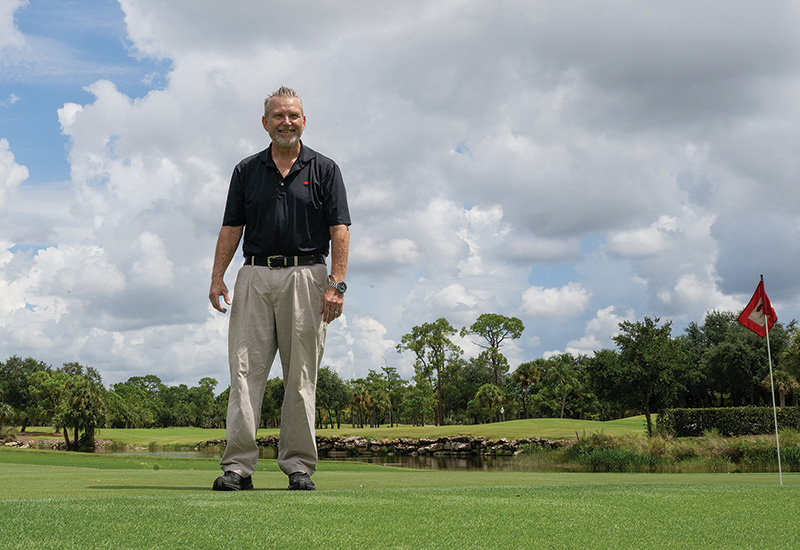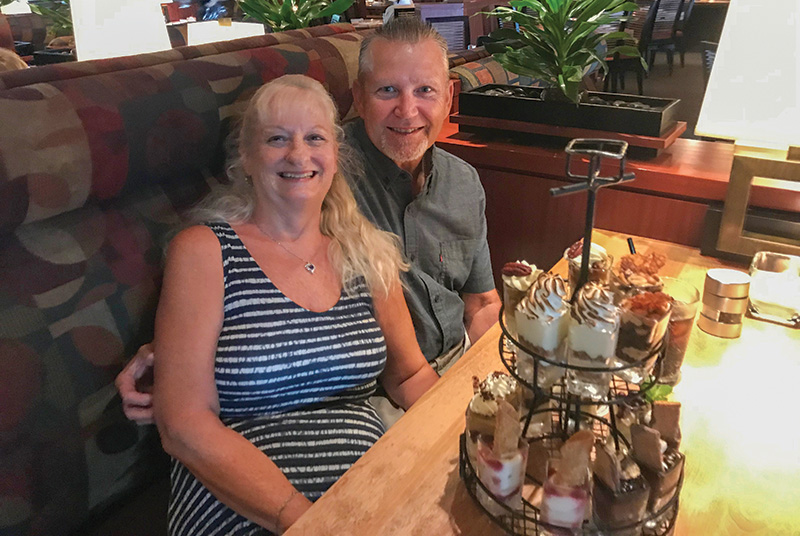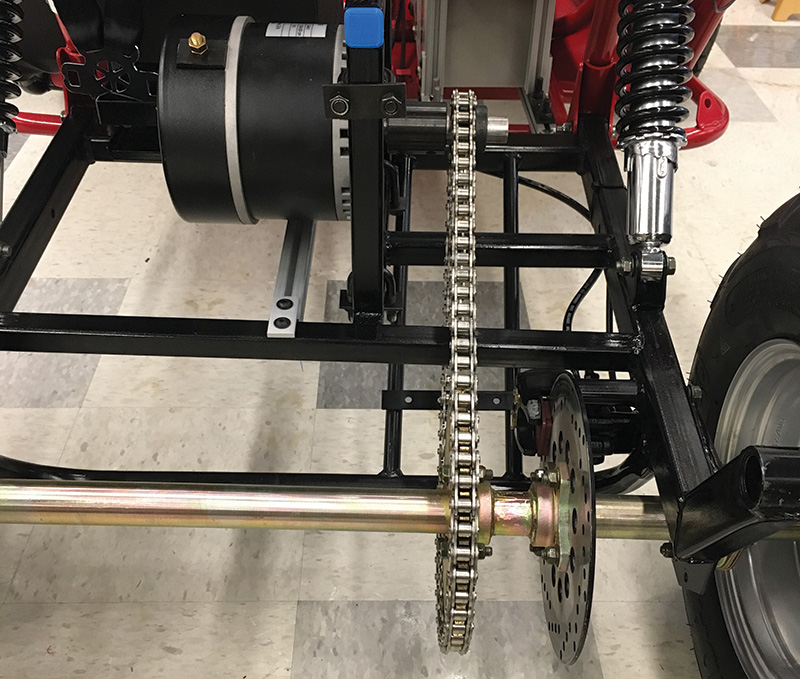
Skip Heinz has been equipment manager at Royal Poinciana Golf Club in Naples, Fla., for the past eight years. Photo by Montana Pritchard
It’s not hard to find the symbolism in the way Skip Heinz first learned there was a way to make money wrenching on turf machines.
As the story goes, a precocious Heinz — 6, maybe 7 at the time — noticed a bunch of junked lawn mowers in a scrap pile near the mobile home park in which he grew up. Heinz, who had already spent a chunk of his childhood in the maintenance building where his dad, Robert, served as golf course superintendent at what was then Key West (Fla.) Country Club, dragged a few out of the heap and set to work.
He fashioned a rotary mower out of the scrap, but found his creation missed a key component.
“I needed a gas tank,” Heinz says. “I asked my dad, and he brought me one home from the golf course.”
The father handed it over, likely chuckling inside at the notion his young son would be able to build a working mower at such a young age. Imagine dad’s surprise, then, when Skip Heinz “put some gas in it and gave it a few pulls,” Skip says. “It ended up starting up, so I was mowing all the yards in the park, charging two, three bucks.”
When Skip disappeared with his Frankenmower, it was his mother, however, who became alarmed, but only because young Skip wasn’t responding to her hollering for him to return home.
“I didn’t tell anybody where I was at. I didn’t want them to be mad,” Skip says. “I started emptying out my pockets of all these $1 bills. I said, ‘Now I can buy a new baseball glove.’
“That was my first repair job, making a rotary mower out of scrap pieces from a junkyard. I can’t say I knew what I was doing, but I followed what they did at my dad’s shop and made it look like I thought it should look.”
And that symbolism? How about this: Heinz, now a Certified Turf Equipment Manager and GCSAA Class A superintendent, is the latest winner of the Edwin Budding Award, which is given annually to “an individual in the turf equipment industry whose actions have gone above and beyond the norm to help shape the turf equipment management industry into what it is today.”
The award’s namesake was an engineer who is credited with having invented the lawnmower.
“Honestly, it really surprised me when Jeff (White, GCSAA president) called,” Heinz says. “I see so many people doing so much, and the equipment manager role has really evolved, the technician’s role has really evolved. I just always thought whether I was an equipment manager or technician or superintendent, no matter what the position, the more I knew, the more I could help the superintendent or the assistant superintendent in their role and the more I could help the club.”

Heinz and his late wife, Deb, at their 29-year anniversary celebration. Photo courtesy of Skip Heinz
A Skip off the old block
Heinz came by his golf course maintenance career naturally. Heinz’s dad, an avid golfer, was driving refrigerator trucks full of lobsters to Miami when he and his pro shop-worker girlfriend married. By the time little Skip was born, Robert had sold the truck and was working at that Key West golf course when a greens mishap occurred.
“The guy who was running the course at the time killed the greens,” Heinz says. “It was a semiprivate club, but they had a board like any private club. He (Robert) told them — he was like the assistant superintendent at the time — he said, ‘Give me 30 days, and I’ll get the greens back in shape. If you’re happy, I get the job. If not, you won’t even have to fire me. I’ll step down.’ He stayed their superintendent for 26 years.”
The Heinzes moved their mobile home next to the course’s maintenance building, and that’s where Skip grew up. He remembers swimming with the members’ kids at the pool, golfing with older kids — and hanging out with his dad in the shop, where he developed a fascination for the profession in general and the big Ford F750 truck driven by his dad’s mechanic friends.
Heinz again found a way to get compensated for his work. Dad would sleep in on Saturdays, but he’d toss Skip the keys and ask him to check the reels the workers would use in the morning to mow the course. Skip took it to the next level. When he was 10 or 11 years old, he realized many of the workers were flush from payday on Fridays.
“I knew they’d be hung over, so I’d go mow greens for them,” Heinz says. “By the time we got to the 12th green, that was near a convenience store. They’d get coffee or milk, and they’d buy me candy, peanuts, whatever. Whoever treated me the best on weekends, I’d find them the next week and mow their greens for them. I’d do that every weekend until dad caught on. He figured if I was doing all that anyway, he’d just put me on a route.”

Heinz views his job through the lens of a superintendent — in part because he was one. Photo by Montana Pritchard
‘Willing to take a chance’
Thus, Heinz embarked on a remarkable career in the turfgrass industry that spanned several job titles (technician, equipment manager, assistant superintendent, EM again — some more official than others, some with an implied slash), five states (Florida, Michigan, Pennsylvania, South Carolina, North Carolina) and 12 (12!) facilities, the most recent of which, Royal Poinciana Golf Club in Naples, Fla., has held onto him the longest. Heinz is approaching his eight-year anniversary there.
“I tell people, ‘When you get good opportunities, take them,’” Heinz says. “You won’t be disappointed if they don’t work out. Not all of mine have worked out. But you always need to be willing to take a chance.”
No doubt Heinz has had so many opportunities because he has managed to bridge the professional gap between equipment manager and superintendent — in part because he has been both.
His ascension began on that same Key West course his dad tended. Not long after Robert’s retirement, the course brought in a construction superintendent to rebuild the place. The younger Heinz, in his last year of school, was working there and was asked if he’d like to join the crew as a technician under a former automobile mechanic. Heinz took the job out of school, but his education was just beginning.
“When I got out of school, nobody ever told me there were colleges that offer turf education,” Heinz says. “My dad learned by reading books. I thought that was the way you had to do it.”
After working three jobs in Florida, Heinz moved to Michigan for three more stops, one of which was as head superintendent for the city of Kalamazoo’s 54-hole golf operation. Even though it was in the Mitten State that Heinz eventually became a superintendent, perhaps his greatest contributions to the industry came from his advocacy for equipment managers there.
Heinz organized and led educational programming for technicians within what was then the Western Michigan GCSA, stressing the importance of learning for EMs. He recalls a pivotal moment in 2005, when he was attending one of his many GCSAA Conference and Trade Shows. Sitting with a table full of superintendents at a dinner, he overheard two superintendents grousing about their equipment technicians.
“They were saying their guys just complained about grinding and topdressing,” Heinz says. “I put my nose in their business. I said, ‘Let me ask you something. How involved do you get them? Do they go to state conferences? Chapter meetings? Do you get them any education other than turning wrenches?’ I told them there’s a huge value in bringing your technician to shows. They said, ‘There’s no education for them.’ I said, ‘You’re wrong. I know the benefit of aerification and topdressing. By attending classes, I’m better informed why the superintendent is making a decision. Therefore, me and him communicate a lot better.’”
That discussion led to an invitation to travel to Washington to speak at a state conference — just one of many talks Heinz has given over the years. This one in particular was a tag-team between Heinz and his boss at the time, former GCSAA President John Fulling, CGCS.
“We put together a seminar about superintendent-technician teamwork,” Heinz recalls. “It was a 50-50 mix in the room. It was funny. I was always taught you could never overdress, but you could always be underdressed. I had a coat and tie. One of the guys said, ‘Which one’s the superintendent and which one is the equipment technician?’
“It was like a bloodbath in there. They despised each other. By the end, they were high-fiving and hugging each other. My closing remarks were, ‘The more education your equipment technician gets, the better. There’s a huge value in attending the national conference. I know it costs. But let ’em go. Help ’em get there. There’s so much GCSAA offers that will help you both.’”

A look at the drivetrain of a solar car Heinz helped fabricate for students at Gulf Coast Community College. Photo by Skip Heinz
Advocating for the profession
A founding member of the International Golf Course Equipment Managers Association in 2006, Heinz was a driving force in its absorption into the GCSAA in 2015.
“He was the push to get equipment managers into the association,” says Fulling, a 35-year association member. “When we first tried to bring them into GCSAA, they thought I was nuts. But that was Skip in the background.”
A consistent theme for Heinz — whether presenting at a faraway chapter conference or lobbying in the background for inclusion in GCSAA — was elevation of the profession of equipment technician. A former member of GCSAA’s first Equipment Manager Task Group, Heinz helped establish the requirements for Levels 1 and 2 of GCSAA’s Equipment Management Certificate Program and, later, the Certified Turf Equipment Manager designation. Whether presenting at state or chapter gatherings in Idaho, Montana, Maryland or Michigan or “at the national,” Heinz was one of the EM profession’s loudest proponents.
“I remember one guy said, ‘I don’t put much stock in being certified. I’m more concerned with being able to do my job,’” Heinz recalls. “I said, ‘Just like superintendents, it helps bring better pay scales, more respect. We’re not respected by them. We’re considered grease monkeys. But I get respect.’ The guy said, ‘You get respect because you were one of them.’ I said, ‘Excuse me? I was an equipment technician long before I was a superintendent. I got respect then because of how I carried myself and how I dressed. That’s the whole problem with equipment technicians. We’re still giving them that shade tree image, that grease monkey image. Once you change that, respect will come, and the money will come. It has nothing to do with being one of them.’”
Bittersweet timing
Heinz says he hasn’t been quite as outspoken for his profession lately, for a couple of reasons.
“I decided people must be tired of hearing me talk,” he says. “There’s so much new blood, it’s their time to shine. There are so many good ones coming up with new, fresh ideas.”
There’s another, more heart-wrenching, reason Heinz pulled back. His wife of 33 years, Deb, was diagnosed with cancer three years ago. As she battled the disease, Heinz vowed to spend more time by her side, even if it was just watching TV.
In late May, White called to tell Skip the news that he had won the Budding Award, but he called Deb’s phone. He left a message, asking Skip to return the call. Deb promptly relayed the message.
“I called, and he told me what was going on,” Heinz says. “I was able to share that with her. She asked why he called. I said, ‘You’re not going to believe this. I just won the highest award any equipment manager can get in the golf industry.’ She was like, ‘Way to go, babe.’ That was a week, week and a half before she ended up passing. At least she knew I got something big in my career. She was my biggest supporter. I was hoping she’d get better and be able to attend show. The call came at a good time. Cancer had taken its toll on her, and I was kinda down. It’s humbling, and it couldn’t have come at a better time. It’s a huge honor. It brings so much joy to me, and it brought so much joy to my wife.”
Andrew Hartsock (ahartsock@gcsaa.org) is GCM’s editor-in-chief.